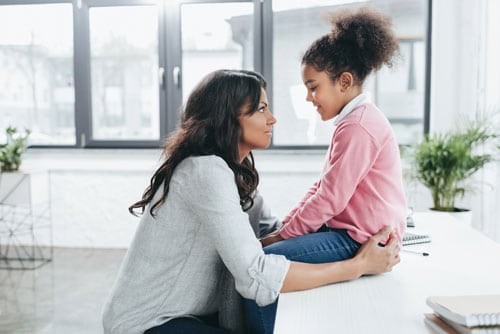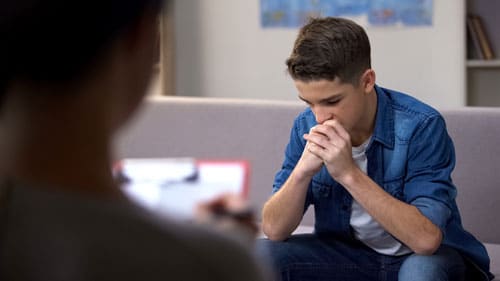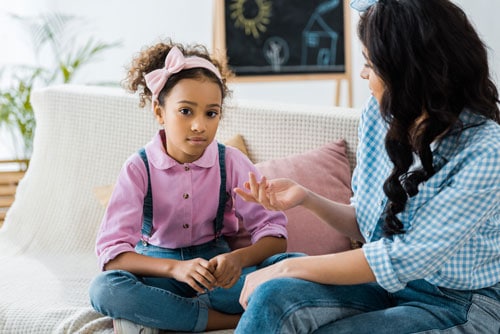You take precautions to protect your kids against illnesses like measles, so you should try to “immunize” them against drug use. You can do this by providing the facts before they find themselves in a risky situation. Parents who are educated about the effects of drug use and know the facts can give their kids the correct information and clear up any misunderstandings. Talk to your kids about drugs so that they know better for the future.
A Basic Guide for How to Explain Drugs to a Child
 Your opinions on alcohol, tobacco, and drugs can strongly influence how your children think about them. Make talking about drugs a part of your general conversations about health and safety. Here are some basics for making the drug discussion a natural conversation at every age:
Your opinions on alcohol, tobacco, and drugs can strongly influence how your children think about them. Make talking about drugs a part of your general conversations about health and safety. Here are some basics for making the drug discussion a natural conversation at every age:
- Start talking to your kids about drugs and alcohol when they’re in grade school, or sooner if necessary.
- Explain what drugs are and their functions, as well as which drugs are illegal and harmful.
- Stick to the facts. Never make substance use sound glamorous or fun, but don’t over exaggerate the harms.
- Always think about what is age-appropriate information.
- When you explain the effects of substances on our bodies and minds, this is a good chance to discourage your child from wanting to try drugs or alcohol.
- Other people (mainly their peers) will talk to your child about drugs, so it’s important to find out what your child knows and clear up any misinformation.
- Kids form attitudes about drug use from what they see at home, among friends, and in the media.
- It will take time for your child to understand the risks of drug and alcohol use.
By The Numbers
Preschool to Age 7
Use “teachable moments” to your advantage. If you see a character in a movie or on TV smoking a cigarette, talk about smoking, nicotine addiction, and the harm smoking can do to your health. This may lead to a discussion about other drugs and their effects.
Stay calm and use terms that your child can understand. Be specific about the effects of the drugs. For example:
- how they make a person feel,
- overdose risk, and
- the long-term damage that can be caused.
Ages 8 to 12
As children get older, you can initiate talks with them by asking what they think about drugs. Asking questions in a nonjudgmental, open-ended way increases the likelihood of an honest response. Show that you are listening and really pay attention to their questions and concerns.
In this age group, kids are usually still willing to talk openly to their parents about touchy issues. Starting communication now helps keep the lines open as kids get older and are less likely to share their thoughts and feelings.
Keep in mind that even if your questions and answers don’t immediately result in a discussion, you will still get your kids thinking about the issue. Show that you’re willing to discuss the substance use issue, and listen to what they have to say. As a result, they may be more willing to come to you for help in the future if necessary.
News items, such as steroids in sports, and addictions among entertainers, can be a jumping-off point for casual conversations about current events and can give you the opportunity to talk about the risks of substance use.
Ages 13 to 17
In this age group, kids are likely to know other kids who use alcohol or drugs and have friends who drive. Many are still willing to talk to their parents and express their thoughts and worries about it. Questions about drug use may become more specific. Use these conversations to:
- Understand your child’s thoughts and feelings
- Talk about the dangers of driving under the influence of alcohol or drugs
- Talk about legal issues — jail time and fines
- Discuss the possibility that someone could be seriously injured or killed
You may consider making a written or verbal contract on the rules about going out or using the car. One effective tactic is to promise to pick your kids up at any time, any place, no questions asked, if the person responsible for driving, has been drinking or using drugs. A contract can also detail other situations. For example, if you find that someone used drugs or alcohol while your child was driving, a six-month driving privilege suspension may be imposed. Be sure to discuss this with your kids from the beginning. This makes your expectations clear and eliminates surprises.
Know Your Child’s Friends (And Their Parents)
No child or family is immune to the effects of drugs. Anybody can end up in trouble, even those who have tried to avoid it. And even if they have been given guidance from their parents. Still, some kids may be more likely to use drugs than others. Unfortunately, kids who have friends who use drugs are likely to try drugs themselves. And kids who feel socially isolated for any reason may turn to substance abuse.
For these reasons, it’s important to:
- Know your child’s friends and their parents
- Stay involved in your kids’ lives
- Get involved if the school runs an anti-drug program (maybe you’ll learn something)
- Pay attention to how your kids are feeling
- Let them know that you’re available to talk
- Listen in a nonjudgmental way
Be Aware
Recognize when your kids are experiencing difficulties so you can provide support and seek additional care if necessary. An open, warm family environment where kids can talk about their feelings, achievements are praised, and self-esteem is promoted, encourages kids to come forward with their questions and concerns. When censored at home, they’ll go to other people to find support and answers.
5 Reasons Why You Should Talk To Your Kids About Drugs
You have a significant influence on your kids’ decisions.
It may not always seem like it but children actually hear their parents’ concerns which is why it’s important to discuss the risks of using drugs and alcohol.
It’s better to talk before they are exposed to alcohol and other drugs.
If you talk to your kids about drugs honestly and directly, they are more likely to respect your advice. Talking early and often can help protect your children.
Some children try alcohol or drugs at a young age.
Children as young as 9 years old already start viewing alcohol in a positive way. Also, about 3,300 kids as young as 12 try marijuana each day. Five in 10 kids as young as 12 get prescription pain relievers for nonmedical purposes. The earlier you start talking, the better it is.
The older kids get, the more likely they’ll try drugs or alcohol.
About 10% of 12-year-olds say they have tried alcohol. However, by the age of 15, that number goes to 50%. Likewise, by the time they are seniors, nearly 70% of high school students will have tried alcohol, half will have used an illegal drug, and more than 20% will have used a prescription drug for a nonmedical purpose.
Not talking still sends kids a message.
Kids don’t necessarily have all the facts when it comes to alcohol and other drugs. If you don’t talk about the risks of underage drinking and substance use, your kids might not see any harm in trying alcohol and other substances. Talking about it allows you to set clear rules about what you expect when it comes to drugs and alcohol.
Answering the Tough Questions
When your child becomes curious about alcohol and drugs, hopefully, they turn to you for answers and advice. Since some questions are difficult to answer, it’s important to be prepared. These questions are written to address alcohol use, but they are common questions you might get about marijuana as well and the answers still apply. These are some common questions and answers:
Why is alcohol bad for me?
Don’t try to scare your child or tell them they can’t handle it. Tell them calmly that alcohol can be bad for their growing brain, obstructs their judgment, and can make them sick. Depending on their age, discuss the severe consequences, including injury or death from accidents, unwanted sexual activity, and health issues such as depression and anxiety.
I’m invited to a party. Can I go?
Ask if an adult will be there or if they think there will be drinking. Remind them that just being at a party where there is underage drinking can get them in trouble. Let them know they can text or call a family member if they’re put in a difficult situation.
Did you drink when you were a kid?
Don’t let your past keep you from talking to your kid about underage drinking. Be honest if you drank as a teenager. Admit that it was risky and point out that we know more now about the risks to children who drink. Think about some relatable stories about making smart decisions when it comes to alcohol.
Why do you drink?
Point out the difference between alcohol use among children and among adults. Explain reasons for drinking, whether to enhance a meal, share good times with friends, or celebrate something special. Be sure to tell them that moderate drinking is not harmful to adult bodies. Also, emphasize that some people can not drink at all, including underage children
What if my friends ask me to?
Helping your child stay strong in the face of peer pressure is one of the most important things you can do to keep them alcohol-free. Work with your child to think of ways to handle these situations. They can simply say “I don’t drink,” “I have a game (work) tomorrow,” or blame the parents: “My parents would kill me if I did.”
You drink, so why can’t I?
Remind them that underage drinking is against the law. And that adult bodies are fully developed mentally and physically so they can handle alcohol. Kids aren’t. Alcohol has a greater effect on kids’ judgment and health, and an underage drinking legal charge can make getting into college more difficult.
How To Explain Drugs to a Child If You’ve Used Drugs
You probably never thought of this but, the fact that you’ve had experience may be an advantage. Here are some examples:
This Isn’t About You
One of the main reasons many parents are reluctant to have the conversation is because they’re afraid of the question, “Did you do drugs?” So remember, this isn’t about what you did or didn’t do. But your personal experiences might help you guide your child in the right direction.
Experts Disagree
For every expert who recommends honesty and openness, another advises not to. The truth is, you can say too much. Start by considering whether your kid demands frankness.
When To Lie
Never lie. You will lose your credibility if you lie about your past and your child finds out about it from another family source. Give an honest answer or none at all.
The Whole Truth?
Avoid giving more information than your child asked for. It’s not a courtroom, it’s a conversation.
Say What You Mean
Along with the other important talks you’ll have with your kids, the point you’re trying to make is what matters. Don’t dance around the subject. Say that you don’t want them to use drugs and give your reasons why.
What Have You Learned?
Before you talk, think. You’ve probably lived your life in an environment where drugs are a fact of life. From TV to personal experiences, you’ve seen examples of how drugs can change lives for the worse. This is an opportunity to share what you have learned.
You Might Say It Like This…
“I tried drugs because some kids I knew were trying it and I wanted to fit in. It took a while to realize that’s never a good reason to do anything. Do you ever feel that pressure?”
…Or This
“My experience with drugs is not a guarantee that yours would be the same because drugs affect everyone differently. I wanted to share my experiences with you because even if they didn’t ruin my life, I’ve seen them ruin other people’s lives. I don’t want you to be one of them.”
Explain That It’s a Disease
It’s important to point out that if someone is addicted, it doesn’t make them a bad person. It means that they are sick. Explain that it’s a disease and that people can and do get better but it can take a long time.
Don’t Just Talk
Your child’s first reaction when you bring up the subject of drugs will probably be to be quiet. Try to make it a two-way conversation. Ask what they think. Ask if their friends talk about it. Keep asking questions and listen to the answers.
Stay Calm
No matter what, try not to raise your voice or lose your temper. It’s alright to admit that it’s not easy to talk about for you either. Finally, if things aren’t going well, suggest talking about it again another time.
Good Luck
It’s a difficult thing but you don’t want your kids referring to your history with drugs as some sort of precedent to copy or use it as a tool against you. But don’t put off having the conversation. It’s not about your past, it’s about their future.
Find Solace at New Directions for Women
When you talk to your kids about drugs, it can be a tricky process. However, it’s an important parental responsibility. At New Directions for Women, we know that addiction is a family disease that affects every member of the family in one way or another. And children of addicts are at higher risk of addiction themselves.
Because substance use disorder is more stigmatizing for women, we are a female-only facility. If you or a female member of your family is addicted to drugs or alcohol, we are experienced in helping families recover from this potentially devastating illness. Contact us. We’re available to talk to you at any time.












